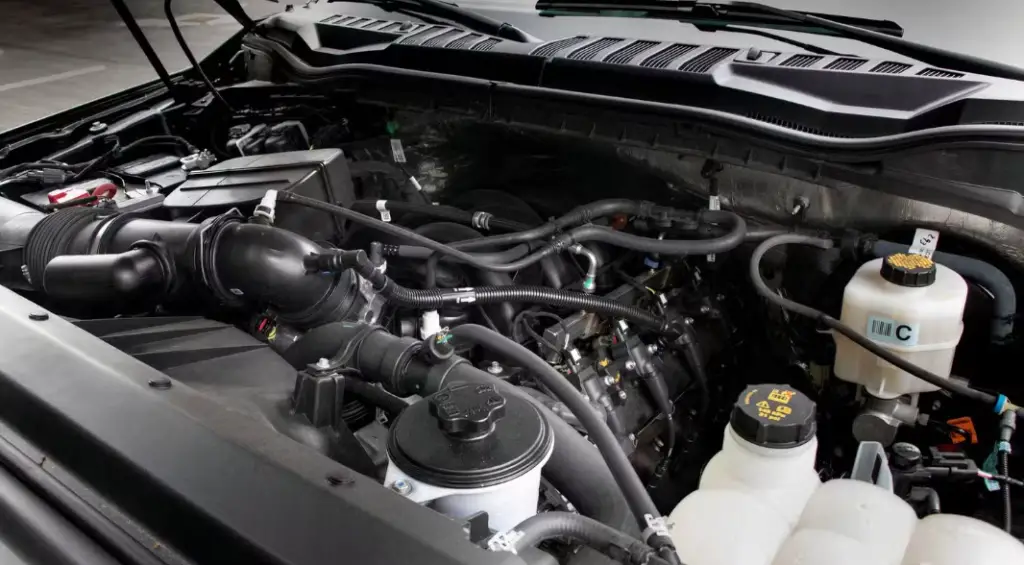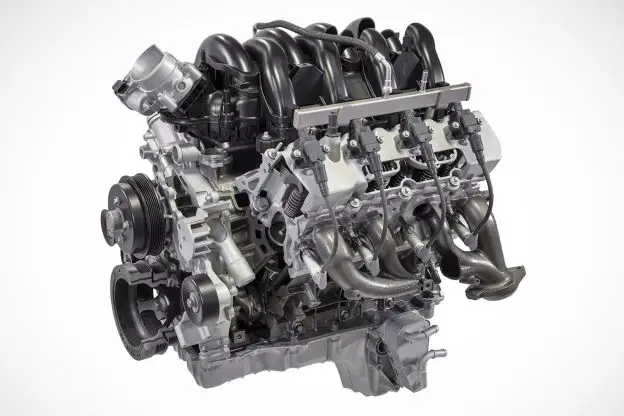The Ford 7.3 gas engine, known as the “Godzilla” engine, is a robust 7.3L V8 that produces 430 horsepower and 475 lb-ft of torque, making it ideal for heavy-duty towing and hauling. With a cast iron block, aluminum heads, and a pushrod design, it offers durability and simplicity.
The Ford 7.3L V8 gas engine, also known as the “Godzilla” engine, is one of the most powerful and reliable gas engines in Ford’s lineup. Introduced in 2020, this engine was designed to provide an alternative to diesel engines for drivers who need serious towing and hauling capabilities but prefer a gas-powered option. Known for its robust build, high torque output, and impressive durability, the 7.3 gas engine has become popular among truck and commercial vehicle owners.
In this blog, we’ll explore the specifications, key features, and performance characteristics of the Ford 7.3 gas engine, along with its benefits and common applications.

Contents
Overview of the Ford 7.3 Gas Engine
The Ford 7.3 gas engine is a V8 engine designed for heavy-duty trucks, large SUVs, and commercial vehicles. It’s primarily used in Ford’s Super Duty truck lineup, including the F-250, F-350, and F-450 models. Built to provide excellent performance and reliability, the 7.3 gas engine combines old-school, pushrod V8 technology with modern engineering, offering a solid mix of power and durability.
Ford 7.3 Gas Engine Specs
Here’s a breakdown of the key specs for the Ford 7.3 gas engine:
- Engine Type: 7.3L V8
- Displacement: 7,306 cc (or 445 cubic inches)
- Cylinder Configuration: V8
- Fuel Type: Gasoline
- Horsepower: 430 horsepower at 5,500 RPM
- Torque: 475 lb-ft at 4,000 RPM
- Compression Ratio: 10.5:1
- Valve Train: Overhead valve (OHV) with two valves per cylinder
- Bore and Stroke: 4.22 inches x 3.98 inches
- Fuel Delivery System: Port fuel injection (PFI)
- Aspiration: Naturally aspirated (no turbo or supercharger)
- Weight: Approximately 580 lbs (dry weight)
- Emissions: Meets current EPA and CARB emissions standards
Performance and Power
One of the main highlights of the Ford 7.3 gas engine is its impressive power output. With 430 horsepower and 475 lb-ft of torque, the 7.3 engine is one of the most powerful gas engines available for heavy-duty trucks. This power, combined with its efficient torque delivery, makes it an excellent choice for towing and hauling.
Unlike turbocharged engines, the naturally aspirated 7.3 V8 delivers consistent power without turbo lag, offering immediate throttle response. Its high torque output at low RPMs allows for smooth and powerful acceleration, making it particularly suitable for heavy-duty applications.
Design and Engineering
Ford engineered the 7.3L V8 engine with durability and simplicity in mind, following a design philosophy that prioritizes reliability over complex technology. Key design elements include:
- Pushrod Design: The overhead valve (OHV) pushrod design is simpler than overhead cam (OHC) engines, leading to fewer moving parts and easier maintenance. It also allows for a more compact engine design, which fits well into heavy-duty trucks.
- Iron Block and Aluminum Heads: The engine uses a cast iron block for strength and durability, with aluminum cylinder heads to reduce weight and improve heat dissipation.
- Port Fuel Injection: The 7.3 engine uses a port fuel injection system rather than direct injection. While direct injection can improve fuel efficiency, port injection is simpler, more reliable, and less prone to carbon buildup. This also reduces maintenance costs over time.
- Heavy-Duty Components: Ford designed the 7.3 V8 engine with heavy-duty components like forged steel crankshafts, large main bearings, and strong connecting rods, making it highly resistant to wear and tear.
Fuel Efficiency
The Ford 7.3 gas engine was not specifically designed for fuel efficiency, but rather for power and durability. This engine tends to consume more fuel than smaller or turbocharged engines, especially under heavy loads. However, it provides a good balance of power and fuel economy for its size and capacity.
While fuel consumption can vary, the 7.3 gas engine often delivers around 10-15 miles per gallon, depending on driving conditions, load, and vehicle model. Its fuel economy is comparable to that of diesel engines when towing, which makes it a viable option for those who prefer gas over diesel.
Applications of the Ford 7.3 Gas Engine
The Ford 7.3 gas engine is used primarily in Ford’s Super Duty truck series and commercial vehicles, as it’s well-suited for applications that require both power and durability. Some popular models featuring the 7.3 engine include:
- Ford F-250 Super Duty
- Ford F-350 Super Duty
- Ford F-450 Super Duty
- Ford F-550 Super Duty
- Ford F-600 Medium-Duty Trucks
- Commercial Vehicles: This engine is also widely used in Ford’s medium-duty trucks, motorhomes, and other commercial vehicles where longevity and reliability are critical.
For owners who need significant towing capacity but prefer the simplicity and cost-effectiveness of a gas engine, the 7.3L V8 provides a powerful alternative to Ford’s diesel options.

Advantages of the Ford 7.3 Gas Engine
The Ford 7.3 gas engine offers several advantages that make it popular among heavy-duty truck owners:
- High Towing and Hauling Capacity: With 430 horsepower and 475 lb-ft of torque, the 7.3 gas engine can handle substantial loads, making it ideal for towing trailers, boats, and other heavy equipment.
- Durability and Longevity: The engine’s simple design, iron block, and heavy-duty components contribute to its long lifespan, making it highly reliable for tough applications.
- Lower Maintenance Costs: Compared to diesel engines, gas engines like the 7.3 are generally less expensive to maintain. The port fuel injection system and lack of turbochargers reduce maintenance costs and potential issues over time.
- No Diesel Emission Fluid (DEF) Requirement: Since it’s a gas engine, there’s no need for DEF, which is a requirement for many modern diesel engines to meet emissions standards.
- Immediate Throttle Response: Unlike turbocharged engines, the naturally aspirated 7.3 V8 provides immediate power delivery, which can be advantageous when towing heavy loads.
Potential Drawbacks
While the 7.3 gas engine offers many benefits, it does have a few downsides:
- Lower Fuel Efficiency: Compared to Ford’s diesel engines, the 7.3 gas engine tends to consume more fuel, especially under heavy loads. This can increase operating costs for long-distance towing.
- Lower Torque Than Diesel: While the 7.3 provides ample torque, it doesn’t quite match the high torque output of diesel engines like Ford’s 6.7L Power Stroke, which can be a consideration for those who need maximum towing capacity.
- Higher Emissions: Gas engines generally produce more CO2 emissions than diesel engines, which may be a consideration for those concerned with environmental impact.
Maintenance Tips for the Ford 7.3 Gas Engine
To maximize the lifespan and performance of the 7.3 gas engine, regular maintenance is key. Here are some maintenance tips:
- Regular Oil Changes: Use high-quality oil and change it at the recommended intervals to keep the engine running smoothly.
- Cooling System Checks: Ensure the cooling system is in good condition, as overheating can cause damage.
- Fuel System Maintenance: Regularly inspect the fuel system and replace the fuel filter as recommended.
- Air Filter Replacement: Keep the air filter clean to maintain optimal airflow and engine performance.
- Periodic Inspections: Conduct regular inspections for wear and tear on critical components like spark plugs, belts, and hoses.
Frequently Asked Questions
Here are some FAQs about Ford 7.3 gas engine specifications –
1. How much horsepower does the Ford 7.3 gas engine produce?
The Ford 7.3 gas engine produces 430 horsepower at 5,500 RPM, providing substantial power for towing and hauling applications.
2. What vehicles use the Ford 7.3 gas engine?
The 7.3 gas engine is commonly found in Ford’s Super Duty trucks, including the F-250, F-350, and F-450 models, as well as in some commercial vehicles and motorhomes.
3. Is the Ford 7.3 gas engine fuel-efficient?
The 7.3 gas engine is not known for high fuel efficiency. It offers reasonable fuel economy for its size and power, but fuel consumption tends to be around 10-15 mpg, depending on load and driving conditions.
4. Does the Ford 7.3 gas engine require special maintenance?
The 7.3 gas engine doesn’t require special maintenance, but regular oil changes, cooling system checks, and fuel system inspections are essential to ensure long-term reliability.
5. How does the Ford 7.3 gas engine compare to Ford’s 6.7L diesel engine?
The 7.3 gas engine offers lower torque and fuel efficiency compared to the 6.7L diesel engine but has lower maintenance costs and no DEF requirement, making it a simpler, more cost-effective option for many drivers.
Conclusion
The Ford 7.3 gas engine is a powerful, durable choice for heavy-duty applications, providing a compelling alternative to diesel engines for drivers who prefer gas power. Its combination of high horsepower, reliable construction, and simpler maintenance requirements make it an attractive option for commercial and heavy-duty truck owners alike.